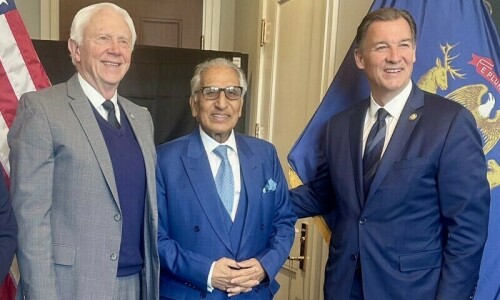OSLO, Oct 7: Africa’s first democratically elected woman president, a Liberian campaigner against rape and a woman who stood up to Yemen’s autocratic regime won the Nobel Peace Prize on Friday in recognition of the importance of women’s rights in the spread of global peace.
The 10 million kronor ($1.5 million) award was split three ways between Liberian President Ellen Johnson Sirleaf, women’s rights activist Leymah Gbowee from the same African country and democracy activist Tawakkul Karman of Yemen — the first Arab woman to win the prize.
No woman had won the prize since 2004, when the committee honoured Wangari Maathai of Kenya. It was also the last year the prize went to an African.
The chairman of the Norwegian Nobel Committee said that Ms Karman’s award should be seen as a signal that both women and Islam have important roles to play in the uprisings known as the Arab Spring, the wave of anti-authoritarian revolts that have challenged rulers across the Arab world.
“The Arab Spring cannot be successful without including the women in it,” he said.
Ms Karman, 32, belongs to a Muslim movement with links to the Muslim Brotherhood, the group “which in the West is perceived as a threat to democracy”. The committee chairman added that “I don’t believe that. There are many signals that that kind of movement can be an important part of the solution.”
Ms Karman is a mother of three who heads the human rights group Women Journalists without Chains. She has been a leading figure in organising the protests against President Abdullah Saleh that kicked off in late January.
“I am very, very happy about this prize,” Ms Karman said. “I give the prize to the youth of revolution in Yemen and the Yemeni people.”
Liberia was ravaged by civil wars for years until 2003. The drawn-out conflict that began in 1989 left about 200,000 people dead and displaced half the country’s population of three million.
The country — created to settle freed American slaves in 1847 — is still struggling to maintain a fragile peace with the help of UN peacekeepers.
Ms Sirleaf, 72, has a master’s degree in public administration from Harvard University and has held top regional jobs at the World Bank, the United Nations and within the Liberian government.
She became Africa’s first elected woman leader in 2005. Nicknamed “Iron Lady”, she was seen as a reformer and peacemaker in Liberia when she took office.
She is running for re-election this month. “This gives me a stronger commitment to work for reconciliation,” Ms Sirleaf said from her home in Monrovia. “Liberians should be proud.”
The committee said it didn’t consider the upcoming election in Liberia when it made its decision.
“She deserves it many times over. She’s brought stability to a place that was going to hell,” said Desmond Tutu, who won the peace prize in 1984 for his non-violent campaign against white racist rule in South Africa.
Ms Gbowee, who organised a group of Christian and Muslim women to challenge Liberia’s warlords, was honoured for mobilising women “across ethnic and religious dividing lines to bring an end to the long war in Liberia, and to ensure women’s participation in elections.”
She has long campaigned for the rights of women and against rape. In 2003, she led hundreds of female protesters through Monrovia to demand swift disarmament of fighters who preyed on women throughout Liberia during 14 years of near-constant civil war.
Ms Gbowee works in Ghana’s capital as the director of Women Peace and Security Network Africa. The group’s website says she is a mother of five.
“I know Leymah to be a warrior daring to enter where others would not dare,” said her assistant, Bertha Amanor. “So fair and straight, and a very nice person.”
Norwegian Prime Minister Jens Stoltenberg called the award “important and worthy.”—AP














































